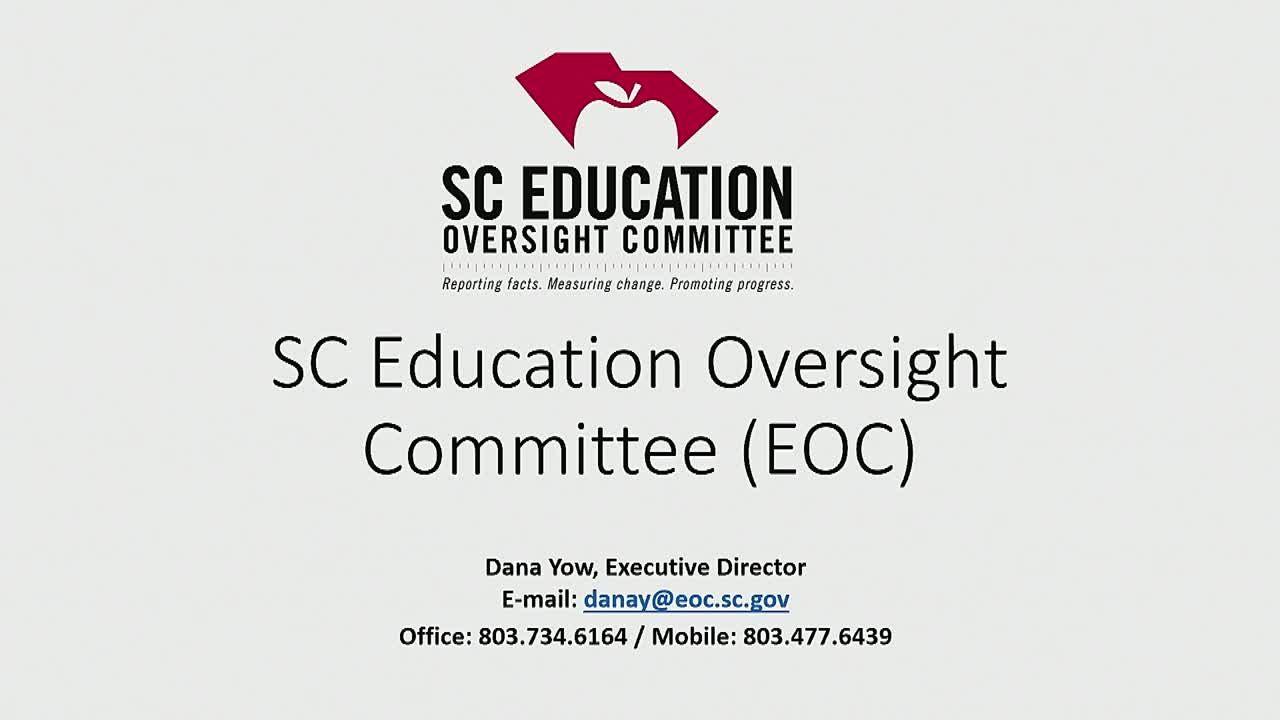Education Oversight Committee briefed lawmakers on state report cards, attendance and rural teacher incentives
Get AI-powered insights, summaries, and transcripts
Subscribe
Summary
The Education Oversight Committee summarized its role in standards and accountability, showed graduation and college-career metrics, described a data dashboard and recent evaluations of rural teacher recruitment and chronic absenteeism.
Dana Yao, executive director of the South Carolina Education Oversight Committee, told members of the House Education and Public Works Committee that the EOC issues the statewide K–12 accountability system and evaluates state-funded education programs.
The EOC "approves the content standards and the statewide assessments for the big 4 — English language arts, math, science and social studies," Yao said, and the panel issues annual school report cards that are legislatively mandated and published each year by Oct. 15.
The committee’s presentation focused on three practical areas: statewide outcomes shown on the EOC dashboard, evaluations of targeted programs such as rural recruitment incentives, and chronic absenteeism. Yao said the EOC maintains dashboards at dashboardsc.sc.gov, produces special studies at the legislature’s request and evaluates the state’s full‑day 4K and other EIA-funded programs.
On outcomes, Yao showed the EOC’s 2024 on‑time graduation figure and related readiness measures. "The graduation rate from 2024 … 85.4 percent of students from 2024 graduated on time," she said. On college- and career‑readiness, the presentation included a figure described within the slide deck; the slide screenshot shown by Yao labeled a readiness bar at roughly 72 percent while members later interpreted the on‑time/ready overlap differently during questions.
Members pressed for clarity on those readiness numbers and on how a high graduation rate can coexist with lower proficiency measures. Representative Bradley asked whether a diploma without a credential of value was meaningful; Yao said the EOC is studying ways to tighten standards and to ensure students leave high school with "something of value." She described multiple routes to career readiness — industry credentials, CTE completion, ASVAB scores and dual‑credit coursework — and said the committee is focusing on students who graduate without those credentials.
The EOC described recent evaluations and projects: a rural recruitment initiative funded by EIA at about $7,600,000 that funds a menu of local incentives (housing, mentoring, recruitment fairs and other inducements) and a planned repeat evaluation in 2026; an alternative‑instruction modes analysis that found face‑to‑face instruction was more effective for achievement in the initial review; and new focus groups with parents and students about chronic absenteeism. On absenteeism Yao said the EOC is still receiving parent focus group results and will share them with the committee when available.
Yao also noted the committee’s limited staff: the EOC has roughly eight full‑time employees. She said the panel issues annual EIA recommendations to the General Assembly and conducts cyclical reviews of the accountability system.
Chairlady Erickson and other members asked for copies of the slides and for the EOC to return with more detail on topics including rural teacher turnover and parent feedback on absenteeism. "I encourage you to take a look at [the dashboard]," Erickson said. The EOC agreed to share the slides and follow‑up materials with committee members.
The presentation closed with an invitation for legislators to nominate reviewers for the cyclical accountability review and an offer from EOC staff to meet with members individually on the data or evaluations.
